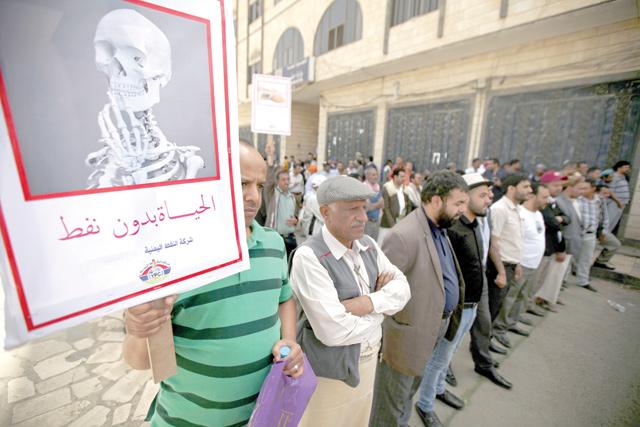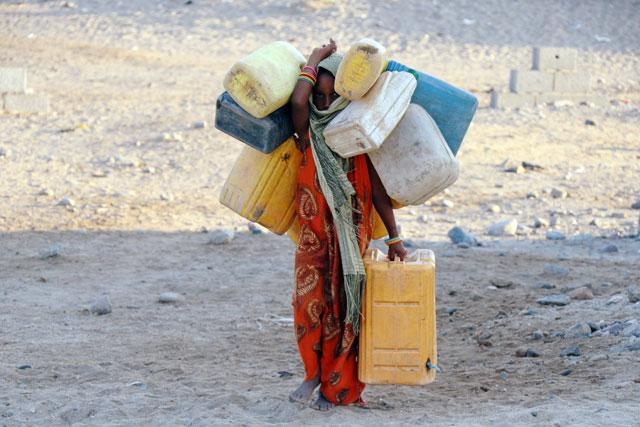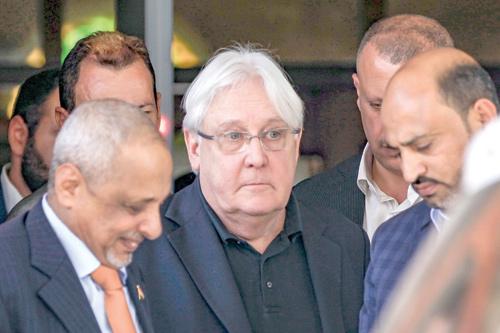You are here
Yemen parties agree details of pullback plan — UN envoy
By AFP - Apr 15,2019 - Last updated at Apr 15,2019

Staffers of the Houthi-run state oil company demonstrate outside the United Nations offices to demand for easing restrictions on oil shipments to Houthi-held ports in Sanaa, Yemen, on Monday. The placard reads: ‘Life without fuel’ (Reuters photo)
UNITED NATIONS, United States — Yemen's government and Houthi rebels have accepted a detailed plan for a much-delayed pullback from the flashpoint city of Hodeida, the UN envoy said Monday, but no timetable was announced for the withdrawals.
The redeployment of forces was agreed in December under a ceasefire deal reached in Sweden that offered the best hope in years of moving toward an end to the war that has pushed Yemen to the brink of famine.
UN Envoy Martin Griffiths told the Security Council that "both parties have now accepted a detailed redeployment plan" for the first stage of the pullback from Hodeida.
Griffiths said he received assurances from Houthi leader Abdul Malik Al Houthi when they met in Sanaa last week that his forces would support the Hodeida agreement, but the envoy sounded a note of caution after so many delays.
"Let us be clear that when — and I hope it is when and not if — these redeployments happen, they will be the first voluntary withdrawal of forces in this long conflict," he said by videoconference from Amman.
The United Nations announced a deal on the two-stage pullback from Hodeida city and its ports in February, but the redeployment failed to materialise on the ground and the peace effort has since stalled.
The United States put the onus on the Houthis to unblock the process and begin redeployments as agreed in the plan.
"The Yemeni government has demonstarted a clear commitment to the United Nations led process," acting US Ambassador Jonathan Cohen told the Security Council.
"It is time for the Houthis to also show the international community that they too are serious about the UN process and the agreements that they themselves reached in Stockholm," he said.
The United States, which has supported the Saudi-led coalition backing the government in Yemen's war, also accused the Houthis of blocking access to a food storage site that contains enough grain to feed 3.7 million people for a month.
The Red Sea Mills "remain closed and the food stocks within may be rotten", said Cohen. "At this point only the Houthis are blocking access to the Mills and they alone will be to blame if the food spoils."
The Red Sea port of Hodeida is the entry point for the bulk of imported goods and relief aid to Yemen.
The detailed plan on the pullback was negotiated by Danish General Michael Lollesgaard who heads a UN monitoring mission.
Following the deal on the first stage, Lollesgaard will now focus on the second phase and seek to resolve disputes over the deployment of local forces in areas from where there has been a pullback.
Griffiths said he was laying the groundwork for broader serious negotiations on ending the war in Yemen but added: "we all need to see tangible progress in Hodeida before moving to focus on the political solution."
The coalition intervened in Yemen in March 2015 to push back an advance by Houthi rebels who continue to hold the capital Sanaa, and restore Hadi to power.
The conflict has unleashed the world's worst humanitarian conflict, according to the United Nations, with millions facing famine.
Related Articles
UNITED NATIONS, United States — The United Nations will put forward a new plan for the pullback of forces from Yemen's flashpoint city of Ho
UNITED NATIONS, United States — The UN Security Council on Thursday urged Yemen's government and Houthi rebels to pull back their forces fro
UNITED NATIONS, United States — The United Nations Security Council met behind closed doors Wednesday in a bid to salvage a stalled truce de

















